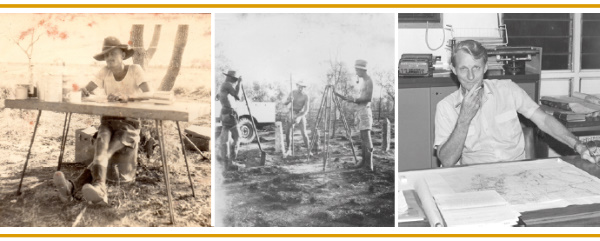

News in 2020
|
| Many of those who know Earl, always recount his eloquent speeches, his strategic thinking, and plans for FIG, which when combined help shape the foundations of the organisation that we know today. It is therefore a great pleasure and honour for me to write this foreword and for FIG to be part of this publication. I sincerely hope that FIG members enjoy reading this personal record from a Northern Territory of Australia outback surveyor who visited over 50 countries whilst leading the way. |
Surveying is a pastime enjoyed (or endured) by many, many people who carry out a host of different occupations; occupations that could range from the simple task of polling people with a question of political significance to the complicated and highly skilled task of measuring the shape and size of the earth.
In some countries the term ‘surveyor’ is used to refer to those who carry out surveys such as those required to define property boundaries or the surveys needed to control the construction of bridges, roads, multi-storied buildings and other structures but in other countries the term is also used to cover those who simply collect information and use it to come to a specific conclusion such as the determination of the value of a property, or how best to design a new suburb, or the production of a particular map.
Surveyors have been around for a long time. Evidence of this can be seen in such ancient works as the three thousand year old map recently found stencilled into the rocks of Italy’s mountains. Ancient art depicts surveyors using crude tapes and other measuring implements while the rectilinear layout of most excavated lost cities is enough to convince even the casual observer that surveying is a very ancient art. Indeed, surveying is often referred to as the world’s first, or oldest profession though this is hotly contested by the military. Even so, military ranks always have contained surveyors though they were referred to as engineers. Roman military surveyors two thousand years ago were famous for their long straight roads and the symmetry of their military encampments.
The International Federation of Surveyors defines a surveyor as, among other things, ‘a professional person with the academic qualifications and technical expertise to practise the science of measurement’. I am a surveyor. I have worked both as a government employed surveyor and as a private practicing surveyor for the best part of forty six years in the Northern Territory of Australia. During that time I took a great interest in the politics of the profession to the extent that over the years I progressed from being an associate member of the Institution of Surveyors Australia (ISA), to national President of that Institution thence to Vice President of the International Federation of Surveyors (FIG), then to President of that federation and finally to President of the International Union for Surveys and Mapping (IUSM). This is the story of my involvement with the Féderation Internationale des Géomètres (FIG).
Continue reading:

Louise Friis-Hansen
9 June 2020